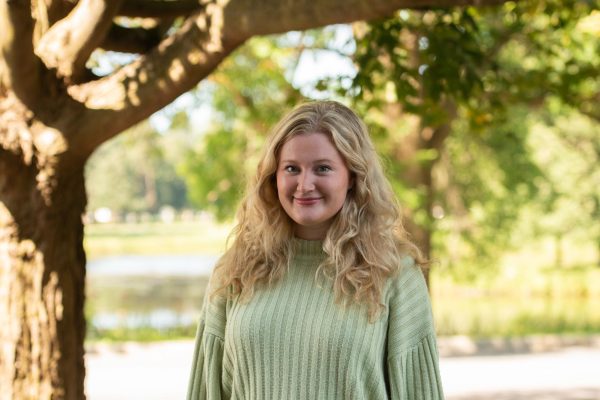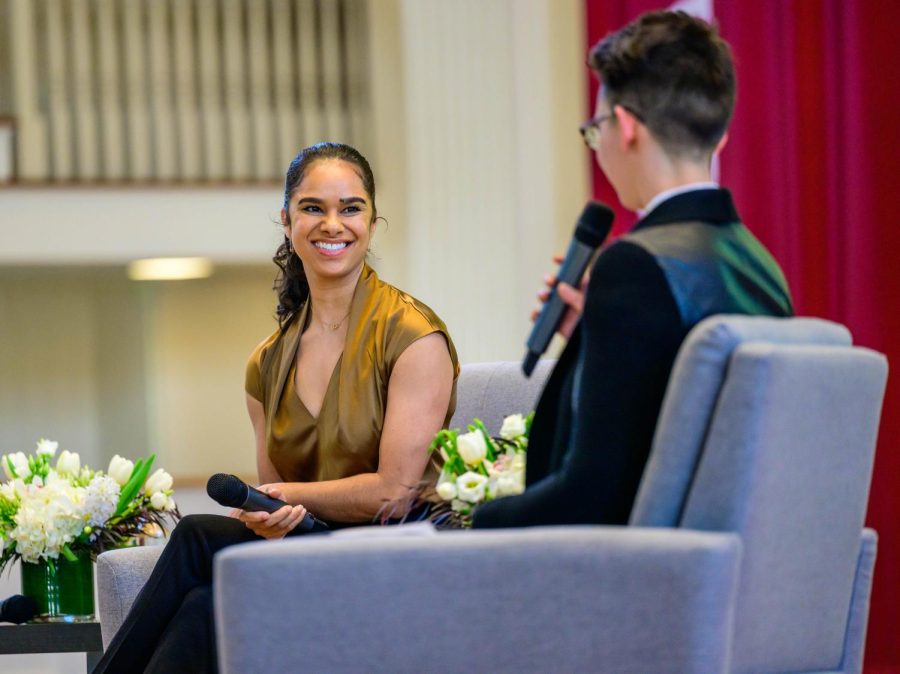Misty Copeland Headlines Arts, Creativity and Innovation Weekend
Ballet dancer, author and activist Misty Copeland visited Colgate University last week, headlining Arts, Creativity and Innovation Weekend — a multi-day celebration to recognize developments and commitments to the arts as outlined in the University’s Third-Century Plan. As the 17th guest brought to campus by the Kerschner Family Series Global Leaders which invites “notable individuals whose work has had a global impact,” Copeland spoke to community members in the Colgate Memorial Chapel on Friday, April 14.
In 2015, Copeland became the first African American woman to be promoted to a principal dancer for the American Ballet Theatre, widely considered one of the most prestigious ballet companies in the world. She has championed efforts to increase diversity in the dance world, launching The Misty Copeland Foundation in 2021 which “aims to bring greater diversity, equity, and inclusion to dance, especially ballet,” according to its website.
Batza Professor of Art & Art History Padma Kaimal and Assistant Professor of Theater Amy Swanson moderated the conversation with Copeland, who discussed why the ballet world continues to struggle with inclusion.
“An inability to really commit to focusing on the issue — I think that is what the ballet world has been lacking throughout its history,” Copeland said. “It’s the feeling that, because they are this niche art form, this elite European art form, they can kind of exist in this bubble and not address issues we are facing in the world. Ballet has now moved beyond Europe — it’s now part of American culture, too, and it needs to reflect who we are and what we look like.”
Copeland also discussed her BE BOLD initiative, an after-school ballet program “designed to make introductory ballet accessible, affordable, and fun.” The unique curriculum “places introductory ballet within the context of a comprehensive child development model,” according to its website, and is open to girls and boys between 8 and 10 years old.
“It’s integrating the history of a variety of dancers so they learn about people who look like them, so they are not just learning about these white European dancers throughout history, but they are seeing themselves reflected in this art form,” Copeland said.
Copeland began studying ballet when she was 13 years old — considered a late age to start — at a community center in Los Angeles. Shen noted how her exposure to ballet changed her life in many ways.
“One of the biggest things, I think, [that] me and my family have seen in terms of changes [from] before I started ballet to after was this confidence that I gained,” Copeland said. “[It] was this ability to feel that my voice mattered and that I had a voice, and showing leadership qualities. And I think that is what the arts can give to a child, can give to a community. So that was really the motivation for me creating the foundation.”
In addition to talking about her experience as a dancer and activist, Copeland discussed her newest memoir, “The Wind at My Back,” which was published in 2022, as well as her upcoming short film, “Flower.”
Before speaking to an audience that included students, parents, faculty, staff, alumni and community members in the chapel at 6 p.m., Copeland met with a selection of students and administration for a small Q&A session. Many of the students in attendance, like sophomore Audrey Giltner, were dancers themselves.
Having danced at a pre-professional Russian ballet company for 17 years before coming to Colgate, Giltner was excited to meet Copeland on campus. She also said she felt that Copeland’s visit showed Colgate’s commitment to investment in the arts.
“I think it’s great that Colgate is supporting the arts — especially ballet because it’s something so important to me that easily can be overlooked,” Giltner said. “Ballet is one of the hardest — if not the hardest — sport because of the discipline, dedication and perfectionist aspect of it. [I saw] Misty Copeland perform a few years ago and was super honored to be able to finally meet her and hear her experiences first-hand.”
Copeland emphasized the role of a strong support system, which Giltner said was particularly inspiring.
“During the student Q&A, she talked to me about how important it is to have a support system as a ballerina,” Giltner recalled. “Having those people around you to share experiences, be your mentor and help you through the grueling aspects of being a ballerina is how she was able to become the person and dancer she is today.”
First-year Carla Hu also attended the Q&A session.
“I think it really stuck out to me how she treated the people who were asking her questions,” Hu reflected. “A lot of people had deep emotional connections to dance […] Misty Copeland did such an amazing job making people feel heard and actually trying to offer advice and encouragement.”
Copeland’s visit and participation in the University’s Arts, Creativity and Innovation Weekend emphasized the role of the arts in Colgate’s Third-Century Plan. One of the first initiatives of the plan is the Middle Campus Initiative which result in the construction of the Benton Center for Creativity and Innovation.
“With renewed attention to the interplay of arts, creativity, and technology, we can encourage students to move across disciplines and infuse their studies with exploration and innovation,” the Third Century Plan’s website states.
Construction began on the Benton Center last fall, and it is expected to be open for the fall 2024 semester.
“The fact Colgate chose Misty Copeland is so unique and exciting because I have always loved the arts and creating my own art,” Hu said. “I’m mostly focused on STEM classes, and that can be super stressful. The fact that Colgate is encouraging art and creativity-focused aspects of college life brings me a lot of joy.”

Payton Gore is a senior from Baltimore, MD concentrating in marine freshwater science with a minor in sociology. She has previously served as a staff writer...







